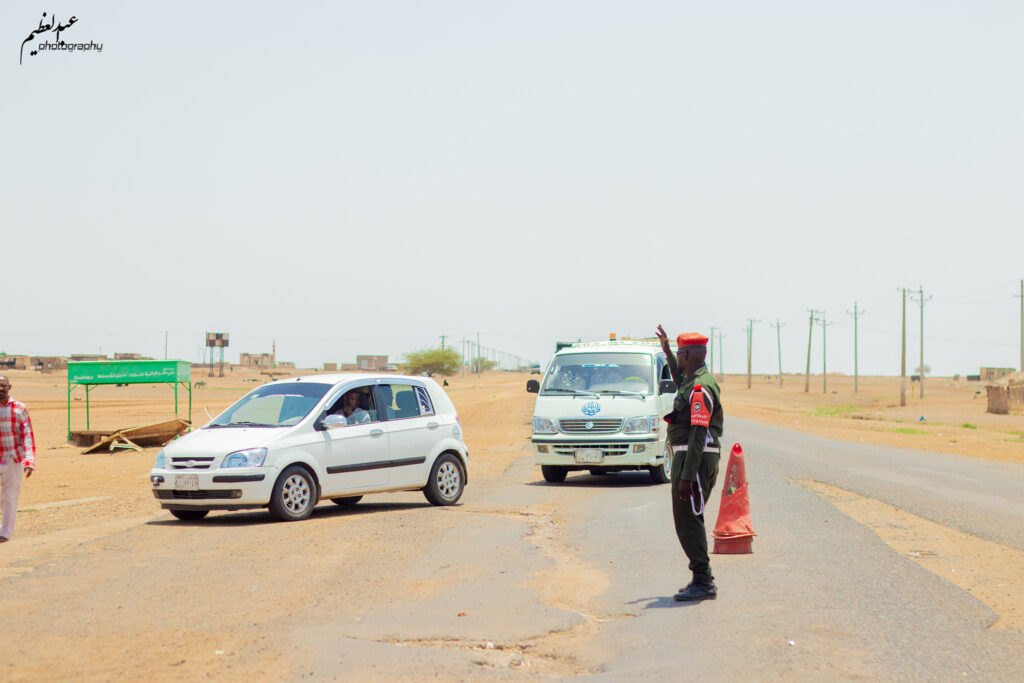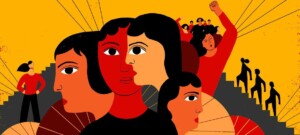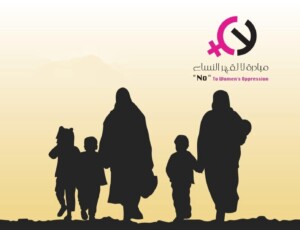Sudan warring parties accused of widespread human rights violations

The Bara-Khartoum transport route (Photo: Abdelazeem / social media)
People fleeing Khartoum are forced to take dirt paths as Rapid Support Forces (RSF) have reportedly closed main roads to the south and east. Lawyers have confirmed ‘terrible violence against women’ by elements of the Sudan Armed Forces (SAF) and the RSF. The African Centre for Justice and Peace Studies (ACJPS) on Thursday issued a report on more than 130 arbitrarily detained and missing persons during the month of May.
In a statement yesterday, Sudan’s Emergency Lawyers condemned the army’s closure of the transport route between Bara in North Kordofan and Khartoum and the harassment by RSF paramilitaries in control of the Khartoum-Wad Madani road and the eastern road leading to River Nile state.
The Emergency Lawyers consider the restriction of traffic in the country “a flagrant violation of human rights, the international humanitarian laws, and Art 12 of the International Covenant on Civil and Political Rights*”.
The human rights defenders also condemn plans by the RSF to close the road connecting Kosti in White Nile state with the North Kordofan capital of El Obeid, which is an important transport route as well.
Emergency lawyer Rehab El Mubarak told Radio Dabanga that people fleeing the war in Khartoum southward to Wad Madani, capital of El Gezira, or northward via the Eastern Road to Nile River state are subjected to “all forms of harassment” on route, including humiliating searches, detentions, and robberies, in addition to having to pay ‘passage fees’ at control posts set up by the RSF or army soldiers.
“These developments forces people to take dirt roads, where they are prone to assaults by armed robbers,” the lawyer explained. “This in turn attracts bandits to towns and villages located near these alternative roads, in particular in the El Butana area in eastern Sudan and in North Kordofan.”
She called on both warring sides to open safe corridors for fleeing civilians and other traffic.
Women victims
Several lawyers have confirmed reports about “terrible violence carried out against women by army and the RSF soldiers alike” since the war broke out in mid-April.
“We have recorded many, many tragic cases,” lawyer Ahmed Mahmoud told Radio Dabanga yesterday. “Women have been killed, raped, kidnapped, detained, or subjected to other forms of abuse. Mothers have to bear the burden of feeding their children because their husbands have been killed or detained.”
According to the Combating Violence Against Women Unit of the Sudanese Ministry of Social Affairs, the documented rape cases likely represent only two per cent of the total cases.
This means that there have been a possible 4,400 cases of sexual violence within 11 weeks, the unit said in a statement on July 20.
The unit stated yesterday that five new rape cases were reported in Khartoum, bringing the total documented cases of sexual violence in Khartoum to 56.
The unit said it received reports of six cases of sexual violence in Nyala, South Darfur, on May 23, bringing the total of cases in the state to 31.
Missing, tortured
The New-York-based African Centre for Justice and Peace Studies has continued to monitor the human rights situation in Sudan since the outbreak of the war, and said in its latest report released on Wednesday that 14 people, 10 men and four women have been released from detention in May.
Three of them, Azizeldin Ahmed, Rajab Mirghani, and Yousef Arof, were arbitrarily held in RSF detention centres in El Riyadh in Khartoum, and in El Sabeel and Ombadda in Omdurman.
The ACJPS further reported about people being beaten daily in an RSF detention centre in Khartoum.
A 34-years old Sudanese man, named El Nour, who fled with his family the fighting in his neighbourhood from El Ma’amoura in Khartoum, found refuge with his relatives in Wad Madani.
On May 9, he returned to El Ma’amoura to check on the homes he had left. They were held, however by RSF soldiers, questioned about their presence, and asked to identify themselves to which they complied. “However, things took a turn for the worst when the group attempted to cut off El Nour’s dreadlocks and he resisted,” the ACJPS statement said.
They tied him up, put him in one of their land cruisers, and forced him to take them to his home, where they shot at the locks. El Nour was then taken to a house in El Ma’amoura, used by the RSF as a temporary detention centre, where he was beaten with leather whips, verbally abused, and his hair cut off.
The following day he was transferred to a detention centre in El Medina El Riyadiya (Sports City), south of Arkaweet. El Nour told ACJPS that the detainees there were beaten on a daily basis. “One of the detainees started passing blood while urinating as a result of the torture.”
On May 16, El Nour was released after he turned down RSF’s request to join the forces.
The African Centre added that the Sudanese air force bombed El Medina El Riyadiya and surrounding areas on June 17, but could not give further information about what happened to the detainees held there.
Radio Dabanga reported earlier that both the SAF and the RSF allegedly detained hundreds of activists and volunteers in Khartoum state since the start of the war. ACJPS said in its latest report that SAF soldiers detained Mohamed Ahmed Madibbo (28) together with several other men at the bus station of Abuzeid Market near the Libya Market in Ombadda, Omdurman, while they were waiting for transportation to East Darfur.
They were taken to a SAF base in Omdurman. Although some detainees were released, the African Centre did not receive any information about the whereabouts of Madibbo.
ACJPS further listed the names of 126 other men and four women who ‘went missing’ in the three cities of Khartoum state in May 2023.
* Article 12 of the International Covenant on Civil and Political Rights reads: 1. Everyone lawfully within the territory of a State shall, within that territory, have the right to liberty of movement and freedom to choose his residence. 2. Everyone shall be free to leave any country, including his own. 3. The above-mentioned rights shall not be subject to any restrictions except those which are provided by law, are necessary to protect national security, public order (ordre public), public health or morals or the rights and freedoms of others, and are consistent with the other rights recognized in the present Covenant. 4. No one shall be arbitrarily deprived of the right to enter his own country.











 and then
and then